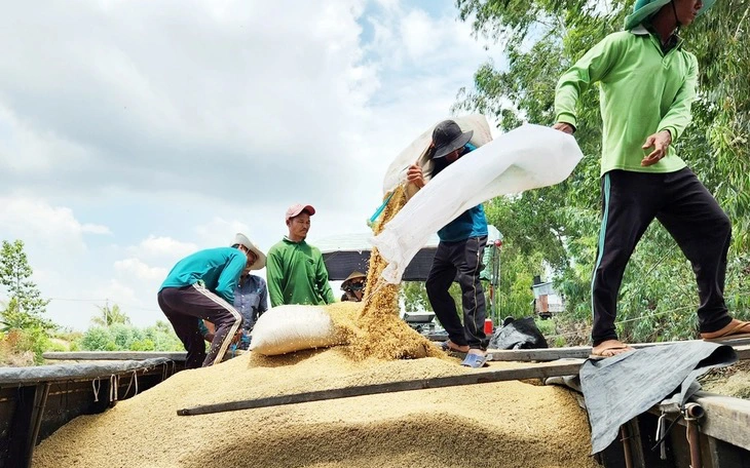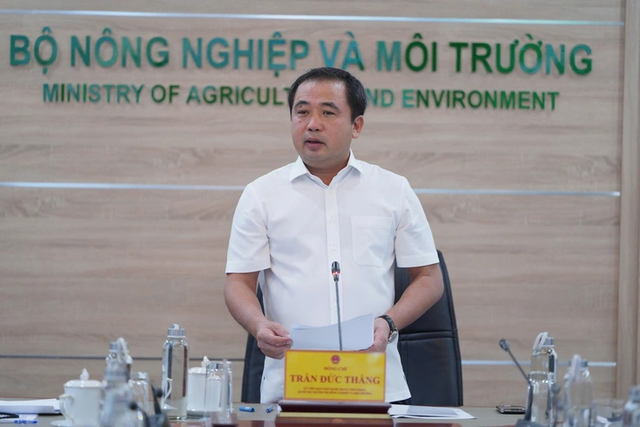
Farmers harvest rice in southern Vietnam. Photo: Tuoi Tre
The ministry attributed market stability to the smooth operation of domestic production and consumption chains, timely releases from national reserves, and the expansion into new export markets.
At a Thursday morning meeting on rice production and consumption, Bui Thi Thanh Tam, chairwoman of the members' council at the Northern Food Corporation, reassured the public that enterprises will continue to buy rice from farmers and that there is no cause for concern.
She noted that state-owned firms are currently stockpiling hundreds of thousands of tonnes of rice, helping to keep the supply stable and prices steady.
Tran Tan Duc, a board member of the Southern Food Corporation, explained that after a brief drop, rice prices have rebounded due to new export contracts with African markets and increased purchases for national reserves.
As of Thursday, high-quality rice was selling for more than VND6,000 (US$0.22) per kilogram, while regular rice varieties held steady at about VND5,000 ($0.18) per kilogram.
Pham Thai Binh, chairman and deputy general director of Trung An Hi-Tech Farming JSC, said the summer-autumn harvest is nearly complete and that the temporary halt by the Philippines will not significantly impact Vietnam's export strategies.
Several businesses have proposed that the government release additional rice from reserves to support exports and maintain Vietnam's credibility in global markets.
A report from the National Authority for Agro-Forestry-Fishery Quality, Processing, and Market Development noted that by the end of August 2025, Vietnam had harvested 3.13 million hectares of rice, producing 20.52 million tonnes.
The remainder of this year's rice output will come mainly from the autumn-winter crop, with over 708,000 hectares planned in the southern region.
Officials said this buffer will be vital in balancing supply and demand, provided coordination between farmers, cooperatives, and enterprises is effectively managed.
The authority also stressed the need for investment in post-harvest infrastructure, including modern storage, milling, and preservation systems, to prevent supply chain congestion at harvest peaks.
With improved infrastructure, businesses would be able to store rice strategically and sell based on favorable global pricing, rather than rushing to unload inventory for quick returns.

Acting Minister of Agriculture and Environment Tran Duc Thang. Photo: Ministry of Agriculture and Environment
Huynh Tan Dat, director of the Plant Production and Protection Department, projected another 13.8 million tonnes of rice output in the final four months of 2025.
Around six million tonnes is expected from the autumn-winter crop in the Mekong Delta alone, giving Vietnam a unique edge not shared by neighboring countries.
This seasonal output serves as a safety net for exports, especially as the Philippines typically boosts imports near the end of the year.
In closing remarks, Acting Minister of Agriculture and Environment Tran Duc Thang confirmed that Vietnam's rice exports are not significantly impacted in the short term.
He said the ministry would ask the prime minister to direct banks to offer low-interest credit, support debt restructuring, and address VAT refund bottlenecks.
The ministry has also appointed five more agricultural attachés to key overseas markets to help expand exports to Africa and South America.
"Vietnam's rice market needs both quick short-term solutions and long-term strategic planning," Thang said.
"We must tackle credit, tax, and trade issues while capitalizing on the autumn-winter crop, growing new markets, and ensuring that production remains profitable and farmers feel secure."
The Philippines, Vietnam's largest rice customer and the world's top importer, began a 60-day suspension of rice imports on September 1 to protect local farmers during their harvest.
Indonesia, meanwhile, announced it would not import rice this year, citing stocks of around four million tonnes, double last year's level.


Max: 1500 characters
There are no comments yet. Be the first to comment.